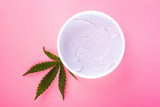2021 Cannabinoid Matchup: THCV vs. THC-P
The world of hemp is expanding before our very own eyes, as more and more cannabinoids are making their way onto the market, each offering its own dazzling properties that can offer dramatic effects in terms of how we feel. THCV and THC-P are two relative newcomers to the scene, and while you may think that they’re extremely similar based on their names, the reality is that they behave very differently when absorbed into the body.
Most hemp enthusiasts who come to The Calm Leaf are seeking out specific properties since they have their own goals in mind. This is why it’s critical to understand the differences between these two cannabinoids. Both of them are federally legal and nontoxic, which means that you can confidently explore either, but at the end of the day, one may be far more capable of suiting your particular needs than the other. This is especially true since their psychoactive properties are extremely different.
Where THCV and THC-P Come From
THCV and THC-P are both cannabinoids that naturally occur in the hemp plant and are not produced using synthetic methods. They are both minor cannabinoids, meaning that they occur in only trace amounts in the plant, but as of now, their exact percentages are unknown. They probably make up less than 0.1% of the plant’s entire chemical structure, each.
THC-P and THCV are also both homologues of delta 9 THC, meaning that due to a similar genetic lineage, they share many of the same structural properties, although their actual effects are quite different from one another. THCV was discovered in 1973, while THC-P was only discovered in late 2019.
Their Psychoactive Properties
THCV and THC-P are both psychoactive cannabinoids, which means that both are capable of getting the user high through intoxicating properties that come from the compound’s attachment to CB1 receptors in the nervous system. But, the highs are extremely different from one another.
THC-P is a CB1 agonist that may bind to these receptors about 31 times as efficiently as delta 9 THC. In short, this means that THC-P may be drastically more psychoactive than delta 9, causing a much stronger high. THC-P is so new that there are no studies on the exact qualities of its high. In other words, we can’t tell you based on data and research exactly what the high feels like. Besides, the exact nature of any high associated with cannabis depends on many factors including the user’s tolerance and the strain of hemp that’s being consumed.
Then, there is THCV, which noticeably has a higher boiling point than delta 9 – 428 degrees rather than 315 degrees – which means that the high associated with it requires a higher decarboxylation level. But, more interestingly, THCV’s high is extremely dose-dependent. At lower doses, it’s a CB1 antagonist, meaning that it won’t get you high at all, and even potentially block other psychoactive cannabinoids from creating an intoxicating response. At higher doses, THCV converts into a CB1 agonist, thus becoming psychoactive, but not as psychoactive as delta 9. And, the high associated with THCV lasts for about half as long as that of delta 9 THC.
Non-Psychoactive Properties
Both THCV and THC-P offer properties that go beyond the psychoactive, as is the case with all cannabinoids since they attach to cannabinoid receptors to regulate various bodily processes that affect how we function and feel each day. THCV is a cannabinoid that prefers to attach to CB2 receptors, which are cannabinoid receptors found in the immune and digestive systems, which means that its properties likely pertain mainly to these processes of the body. While THCV has been found to potentailly offer some anti-seizure activity through neuroprotectant activity, more notably, it seems to have a regulatory effect on blood sugar and insulin levels, which may be extremely valuable to diabetes research. Further, it seems to play a role in managing obesity, while possibly suppressing appetite and minimizing food cravings.
THC-P is a cannabinoid we’ve known about for far shorter of a period of time than THCV, and so you won’t find as many studies on its distinctive effects. But the researchers who discovered THC-P did analyze it for its various properties and discovered that its effects seem to mimic those of delta 9, only at higher potency levels. Research shows that THC-P may play a role in pain, nausea, appetite, mood, sleep and more, as the cannabinoid works on both CB1 receptors in the nervous system and CB2 receptors much like THCV.
Purpose for Taking Them
A lot of people are taking THCV because it’s new and they’re interested in seeing what it’s like. While it can deliver a high, and that’s obviously a big part of its commercial appeal, it’s important to know that experiencing its psychoactive properties is not as straightforward as it is with other cannabinoids, as we’ve described earlier.
THC-P is another cannabinoid that most people are seeking out because of its recreational properties, as it may be powerfully intoxicating. Still, however, it offers other properties that make it fully worth experimenting with, as seen above.
Whether or Not They are Legal
The Farm Bill in 2018 legalized both THCV and THC-P throughout the United States through federal legislation. However, 12 states have banned delta 8 THC, and while the wording legislation is vague, it’s likely that THCV and THC-P are banned in these states as well:
- Alaska
- Arizona
- Arkansas
- Colorado
- Delaware
- Idaho
- Iowa
- Mississippi
- Montana
- Rhode Island
- Utah
Both THCV and THC-P are metabolized by THC-COOH, an enzyme that breaks down delta 9 THC as well. Standard urine tests are not seeking presence of delta 9 THC, but THC-COOH. What this means is that using either of these cannabinoids can result in a positive drug test result that could threaten your employment. It’s also important to note that both THCV and THC-P are intoxicating substances that can impair driving. Driving while intoxicated on either cannabinoid can be dangerous, and can result in criminal charges regardless of their legality.
Products That They Come in
You will find that THCV and THC-P come in the same product forms, because both cannabinoids are converted into oil-based extracts that are easy to combine with other ingredients.
- Vape Carts: Cartridges, or carts, are 510-threaded to attach to standard vape pens, containing a vape oil in many different strain options.
- Disposable Vapes: Disposable vapes are pre-assembled vaping systems that never need to be recharged or refilled at any time.
- Tinctures: Tinctures are administered sublingually, being oil-based formulas in various strength options.
- Edibles: Edibles such as gummies are associated with a body high sensation and long-lasting effects.
- Flower: Flower refers to hemp flower buds infused with THCV or THC-P, in an abundance of strain options.
- Dabs: Dabs refer to potent concentrates that are vaporized with a dabbing device. They’re generally too potent for beginners.
- Capsules: You can also find THCV and THC-P oils in encapsulated form.
THCV and THC-P: Two Hemp Derivatives that are Worth Exploring
THCV and THC-P are each worth trying out if you’re open to experiencing new properties and effects associated with the hemp plant. If you have specific goals that you’re seeking out, you may very well find that one of these two is far more useful as part of a daily routine than the other.
At The Calm Leaf, you can find a generous variety of both THCV and THC-P products to enjoy, and you can feel confident that you’re getting the best options available as we go to great lengths to deliver top quality. All THCV and THC-P are derived from organic hemp and have been fully lab-tested to guarantee proper purity and potency levels.
Recent Posts
-
Can You Add Delta 10 THC to Your Workout Regimen?
The pursuit of an optimized lifestyle has people exploring every tool at their disposal. We meticulo …Dec 29, 2025 -
What is a Topical Entourage Effect?
The world of wellness and skincare is full of fascinating concepts, and few are as intriguing as the …Dec 26, 2025 -
2025 Cannabinoid Matchup: Delta 8 THC vs. PHC
The cannabis universe never ceases to amaze, and 2025 is proving to be a blockbuster year for cannab …Dec 22, 2025


